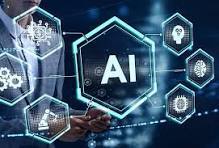The Role of AI, IoT, and AR/VR in Sustainable Business Practices
In the ever-evolving landscape of modern business, sustainability has become more than just the norm—it's a strategic imperative. The integration of cutting-edge technologies like Artificial Intelligence (AI), Internet of Things (IoT), and Augmented Reality/Virtual Reality (AR/VR) has emerged as a game-changer, empowering companies to forge a path toward sustainable practices.
The AI Revolution in Sustainability:
Artificial Intelligence is at the forefront of revolutionizing sustainability efforts. These services streamline resource management through advanced algorithms and data analytics. Generative AI development services, for instance, empower predictive analytics models, enabling businesses to forecast and mitigate potential inefficiencies. In manufacturing, AI-driven predictive maintenance not only decreases downtime but also reduces unnecessary waste, contributing to a more sustainable operational cycle.
One of AI's remarkable contributions to sustainability lies in optimizing energy consumption. AI-powered energy management systems analyze intricate patterns in usage data to identify opportunities for efficiency improvements. Such systems play a pivotal role in minimizing carbon footprints by optimizing energy usage in real time.
IoT's Role in Environmental Conservation:
The Internet of Things (IoT) acts as a silent facilitator in the realm of sustainability by enabling extensive data collection and analysis. IoT devices provide real-time tracking and monitoring in supply chain management, revolutionizing logistics while minimizing environmental impact. They not only streamline operations but also reduce waste and greenhouse gas emissions by optimizing routes and resources.
Moreover, IoT sensors embedded in smart grids and buildings create intelligent systems that adapt to consumption patterns. These systems efficiently manage resources like electricity and water, thereby contributing significantly to energy conservation and sustainable resource utilization.
Immersive Technologies Shaping Sustainable Practices:
The potential of Augmented Reality (AR) and Virtual Reality (VR) extends beyond entertainment. These immersive technologies are becoming integral to sustainable business practices. AR/VR facilitates immersive training and simulations, offering an eco-friendly alternative to resource-intensive traditional training methods.
In the evolving landscape of technology, how does AI reduce human error? Employees can learn and practice sustainable procedures in realistic simulated environments, reducing the need for physical resources and increasing proficiency in their work.
Additionally, AR/VR technologies enable remote collaboration, cutting down on travel-related emissions. Through virtual meetings and remote workspaces, businesses reduce their carbon footprint while fostering global connections and collaborations.
The Role of Expert Development Companies:
Amidst these challenges, the role of AI development companies specializing in custom software solutions and AI becomes indispensable. These entities offer tailored solutions that address specific sustainability needs of businesses. Any software development company, equipped with their expertise in scalable and adaptive solutions, play a pivotal role in driving sustainable innovation forward.
The convergence of AI, IoT, and AR/VR technologies presents an unprecedented opportunity for businesses to achieve their sustainability goals. Collaboration between technology providers, businesses, and regulatory bodies is crucial in harnessing the full potential of these technologies.
By leveraging the capabilities of AI, IoT, and AR/VR in their software development process, businesses can not only achieve operational efficiency but also align their practices with sustainable objectives. The fusion of technology and sustainability isn't just a trend; it's a commitment towards building a greener, more environmentally-conscious future for generations to come.

Overcoming Challenges for Sustainable Transformation:
Navigating through the challenges in implementing these technologies is pivotal for sustainable transformation. Addressing resistance to change requires a strategic approach that involves comprehensive training programs and transparent communication about the benefits of these technologies for both the business and the environment.
Increasing awareness about the capabilities of AI, IoT, and AR/VR in fostering sustainability is crucial. Educational initiatives and collaborative forums can bridge the knowledge gap, encouraging businesses to explore and embrace these transformative technologies.
Additionally, tackling integration complexities demands collaborative efforts between tech providers and businesses. Tailored solutions from adept development companies alleviate these challenges by offering seamless integrations and ongoing support, ensuring a smoother transition toward sustainable practices.
A Transformative Path Forward:
In the dynamic landscape of business, the integration of AI, IoT, and AR/VR technologies offers an unprecedented opportunity for companies to redefine their approaches towards sustainability. By embracing these technologies, businesses not only enhance operational efficiencies but also solidify their commitment to creating a more environmentally-conscious world.
Through collaborative efforts, adept utilization of technology, and a firm dedication to ethical and secure practices, businesses can navigate challenges and pave the way for a future where sustainability and innovation go hand in hand. This transformative path is not just a business strategy; it's a global commitment towards a greener, more sustainable future for generations to come.
Wrapping Up
In conclusion, the integration of AI, IoT, and AR/VR presents a transformative opportunity for businesses committed to sustainability. These technologies, ranging from predictive analytics in AI to real-time tracking in IoT and immersive training with AR/VR, allow companies to enhance operational efficiency while solidifying their dedication to sustainable practices.
The role of expert development companies becomes crucial in overcoming challenges and ensuring a seamless transition, emphasizing the collaborative efforts needed among technology providers, businesses, and regulatory bodies. This commitment to sustainable innovation is not just a strategic choice but a global imperative, paving the way for a greener and more responsible future.
